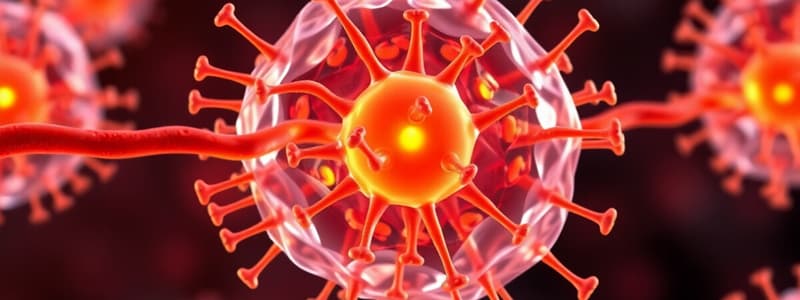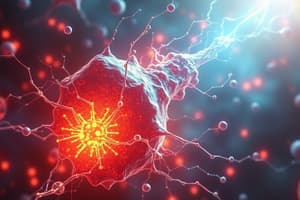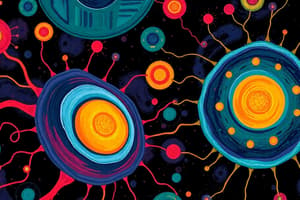Podcast
Questions and Answers
What occurs during the Absolute Refractory Period?
What occurs during the Absolute Refractory Period?
- A new action potential can be initiated with any stimulus.
- The cell returns to a fully excitable state.
- Na⁺ channels are inactive and cannot be reopened. (correct)
- K⁺ channels are closed, allowing for depolarization.
How does the Relative Refractory Period differ from the Absolute Refractory Period?
How does the Relative Refractory Period differ from the Absolute Refractory Period?
- A stronger stimulus than normal is required to initiate an action potential. (correct)
- Only neurotransmitters can cause a response in this period.
- No new action potential can occur regardless of stimulus strength.
- K⁺ channels begin to close, allowing depolarization to occur.
What is the main advantage of saltatory conduction in myelinated nerves?
What is the main advantage of saltatory conduction in myelinated nerves?
- It enables quicker responses to external stimuli.
- It allows for the generation of more action potentials.
- It causes uniform depolarization along the entire nerve length.
- It prevents the loss of ion concentration along the nerve. (correct)
What facilitates the continuation of the action potential in an unmyelinated nerve?
What facilitates the continuation of the action potential in an unmyelinated nerve?
Why is the intracellular potential more negative than normal during the Relative Refractory Period?
Why is the intracellular potential more negative than normal during the Relative Refractory Period?
Which type of cellular communication involves cells sending signals to nearby cells?
Which type of cellular communication involves cells sending signals to nearby cells?
What distinguishes autocrine communication from intracrine communication?
What distinguishes autocrine communication from intracrine communication?
Which receptors are located in the cell membrane?
Which receptors are located in the cell membrane?
What defines a receptor's specificity?
What defines a receptor's specificity?
Which of the following best describes the response time of intracellular receptors compared to cell surface receptors?
Which of the following best describes the response time of intracellular receptors compared to cell surface receptors?
What effect does an antagonist have on a receptor?
What effect does an antagonist have on a receptor?
How does increased ligand concentration affect receptor saturation?
How does increased ligand concentration affect receptor saturation?
What is a main property of receptors involved in cellular communications?
What is a main property of receptors involved in cellular communications?
Which type of receptor is specifically found in the nucleus?
Which type of receptor is specifically found in the nucleus?
What is the resting membrane potential primarily caused by?
What is the resting membrane potential primarily caused by?
Which type of potential is responsible for rapid information transmission in nerve cells?
Which type of potential is responsible for rapid information transmission in nerve cells?
What molecules are typically involved in neurocrine communication?
What molecules are typically involved in neurocrine communication?
What happens during down-regulation in response to continuous stimulus?
What happens during down-regulation in response to continuous stimulus?
What type of hormones primarily activate intracellular receptors?
What type of hormones primarily activate intracellular receptors?
What is the role of graded potentials in excitable cells?
What is the role of graded potentials in excitable cells?
What characterizes a high-affinity receptor?
What characterizes a high-affinity receptor?
What is the primary role of the Na⁺/K⁺ pump in maintaining the resting membrane potential?
What is the primary role of the Na⁺/K⁺ pump in maintaining the resting membrane potential?
What is the typical value of the resting membrane potential in a neuron?
What is the typical value of the resting membrane potential in a neuron?
Which type of potential occurs in sensory receptors in response to external stimuli?
Which type of potential occurs in sensory receptors in response to external stimuli?
What is the threshold potential required for initiating an action potential?
What is the threshold potential required for initiating an action potential?
Which characteristic describes graded potentials?
Which characteristic describes graded potentials?
What type of potential is generated at the neuromuscular junction?
What type of potential is generated at the neuromuscular junction?
How does the outflow of K⁺ ions influence the resting membrane potential?
How does the outflow of K⁺ ions influence the resting membrane potential?
What feature of graded potentials indicates that they weaken with distance?
What feature of graded potentials indicates that they weaken with distance?
What must occur for an action potential to be initiated?
What must occur for an action potential to be initiated?
During which phase do Na⁺ channels rapidly open and allow Na⁺ ions to enter the cell?
During which phase do Na⁺ channels rapidly open and allow Na⁺ ions to enter the cell?
What is the approximate peak membrane potential reached during an action potential?
What is the approximate peak membrane potential reached during an action potential?
What is the primary function of the Na⁺/K⁺ pump during the return to resting potential?
What is the primary function of the Na⁺/K⁺ pump during the return to resting potential?
What characterizes the all-or-nothing principle of action potentials?
What characterizes the all-or-nothing principle of action potentials?
What happens during the hyperpolarization phase of an action potential?
What happens during the hyperpolarization phase of an action potential?
What distinguishes the absolute refractory period from the relative refractory period?
What distinguishes the absolute refractory period from the relative refractory period?
What is the primary purpose of the refractory periods in action potentials?
What is the primary purpose of the refractory periods in action potentials?
Flashcards
Intracrine Communication
Intracrine Communication
Cell communication where the signal molecule acts within the same cell without leaving it.
Juxtacrine Communication
Juxtacrine Communication
Cell communication involving direct contact between cells.
Autocrine Communication
Autocrine Communication
Cell secretes a signal, and the same cell receives and reacts to it.
Paracrine Communication
Paracrine Communication
Signup and view all the flashcards
Neurocrine Communication
Neurocrine Communication
Signup and view all the flashcards
Endocrine Communication
Endocrine Communication
Signup and view all the flashcards
Cell Surface Receptors
Cell Surface Receptors
Signup and view all the flashcards
Intracellular Receptors
Intracellular Receptors
Signup and view all the flashcards
Receptor Specificity
Receptor Specificity
Signup and view all the flashcards
Receptor Affinity
Receptor Affinity
Signup and view all the flashcards
Receptor Saturation
Receptor Saturation
Signup and view all the flashcards
Receptor Competition
Receptor Competition
Signup and view all the flashcards
Receptor Up-regulation
Receptor Up-regulation
Signup and view all the flashcards
Receptor Down-regulation
Receptor Down-regulation
Signup and view all the flashcards
Agonist
Agonist
Signup and view all the flashcards
Antagonist
Antagonist
Signup and view all the flashcards
Resting Potential
Resting Potential
Signup and view all the flashcards
Sodium-Potassium Pump
Sodium-Potassium Pump
Signup and view all the flashcards
Potassium Leak Channels
Potassium Leak Channels
Signup and view all the flashcards
Threshold Potential
Threshold Potential
Signup and view all the flashcards
Action Potential
Action Potential
Signup and view all the flashcards
Graded Potential
Graded Potential
Signup and view all the flashcards
Receptor Potential
Receptor Potential
Signup and view all the flashcards
Postsynaptic Potential
Postsynaptic Potential
Signup and view all the flashcards
Absolute Refractory Period (ARP)
Absolute Refractory Period (ARP)
Signup and view all the flashcards
Summation
Summation
Signup and view all the flashcards
Relative Refractory Period (RRP)
Relative Refractory Period (RRP)
Signup and view all the flashcards
Action Potential Propagation
Action Potential Propagation
Signup and view all the flashcards
Voltage-Gated Ion Channels
Voltage-Gated Ion Channels
Signup and view all the flashcards
Conduction in Unmyelinated Axons
Conduction in Unmyelinated Axons
Signup and view all the flashcards
Depolarization
Depolarization
Signup and view all the flashcards
Saltatory Conduction
Saltatory Conduction
Signup and view all the flashcards
Repolarization
Repolarization
Signup and view all the flashcards
Hyperpolarization
Hyperpolarization
Signup and view all the flashcards
Refractory Period
Refractory Period
Signup and view all the flashcards
Study Notes
Cellular Communication
- Cells coordinate with each other creating order in the organism
- Intracrine: Cells communicate with itself
- Juxtacrine: Cells communicate via direct contact
- Autocrine: Cells respond to signals they produce
- Paracrine: Cells send signals to nearby cells over short distances
- Neurocrine: Nerve cells send signals using neurotransmitters via synapses
- Endocrine: Hormones are carried by blood to target cells over long distances.
Difference Between Autocrine and Intracrine Communication
- Autocrine: A cell secretes a signal molecule. The molecule moves out of the cell and binds to a receptor on the same cell. It returns to the cell to show its effect.
- Intracrine: The signal molecule is produced inside the cell, binds to a receptor within the cell, and shows its effect without leaving the cell.
Receptor Types
- Cells use receptors to communicate with external stimuli
- Receptors respond to stimuli and initiate biochemical processes in the cell
- Membrane receptors receive external stimuli
- Intracellular receptors receive signals within the cell
Receptor Types (Membrane/Intracellular)
- G-protein Coupled Receptors (membrane)
- Ligand-Gated Ion Channels (membrane)
- Enzyme-Linked Receptors (membrane)
- Nuclear Receptors (intracellular)
Receptor Localization
- Intracellular receptors:
- Steroid hormones, thyroid hormones, vitamin D
- Lipophilic
- Intracellular hormone-receptor complex
- Gene transcription
- Hours/days
- Cell surface receptors:
- Protein, peptide, and amino acid derivative hormones
- Hydrophilic
- Cell membrane
- Second messengers
- Protein phosphorylation
- Seconds/minutes/hours
Properties of Receptors
-
Specificity: Each receptor recognizes a specific ligand molecule
-
Affinity: Strength of binding between receptor and ligand—high affinity receptors bind at low concentrations
-
Saturation: Receptors have a limited number of binding sites, and are saturated when they reach max
-
Competition: Different molecules can compete for the same receptor
-
Hypersensitivity—upregulation: Increase in receptor number following decrease in ligand conc/continuous stimulus
-
Insensitivity—downregulation: Decrease in receptor number following a continuous stimulus
-
Agonists: Molecules that bind to receptors and activate a response.
-
Antagonists: Molecules that bind to receptors and inhibit a response.
Membrane Potentials and Types
-
Membrane potentials are critical for cell communication, response, processing of information.
-
Excitable cells (nerve and muscle cells) use potential changes to process and respond to signals
-
Resting Membrane Potential:
- The cell's baseline electrical state when not stimulated
-
Threshold Membrane Potential:
- The level that triggers an action potential (approximately -55mV)
-
Action Potential:
- Rapid change in membrane potential crucial for information transmission (nerve and muscle cells)
Resting Membrane Potential
- The electrical potential difference across the cell membrane when not stimulated, roughly -70 mV in most cells.
- Caused by ion concentration differences across the membrane (especially K+ and Na+) and the selective permeability of the membrane.
- The resting potential prepares the cell for stimulus.
Contributors to Resting Membrane Potential
- Na+/K+ Pump: Maintains the balance of Na+ and K+ ions across the membrane (maintaining negative charge)
- K+ Leak Channels: K+ ions leak out of the cell, contributing to the negative voltage
- Negatively Charged Ions: Negatively charged molecules (proteins and phosphates) inside the cell create a negative internal environment
Threshold Potential
- The minimum membrane potential required to trigger an action potential (approximately -55 mV).
- Voltage-gated Na+ channels open rapidly when this potential is reached, starting the action potential.
Action Potential
- A rapid, large change in the membrane potential of a cell that triggers a response in a neuron or muscle cell.
- Critical for transmitting signals in nerve and muscle cells.
Graded Potentials
- Gradual changes in membrane potential, summing or combining to influence the cell.
- Unlike all-or-none action potentials, they are proportional to the stimulus (stronger stimulus = more substantial change)
Action Potential Propagation
- Myelinated axons (saltatory conduction)
- Unmyelinated axons
Refractory Periods
- Absolute Refractory period: The cell cannot fire another action potential once this period begins; because Na+ channels are inactive
- Relative Refractory Period: The cell can fire another action potential but it needs a stronger stimulus because the membrane potential is farther from the threshold; because K+ channels are still open
Studying That Suits You
Use AI to generate personalized quizzes and flashcards to suit your learning preferences.




